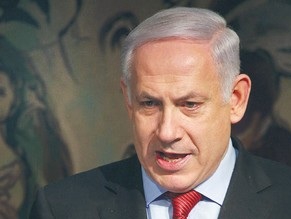|
World Jewish News

Photo: Marc Israel Sellem/The Jerusalem Post
|
Netanyahu promises: I'll push the button on Iran if I must
05.11.2012, Israel and the World Prime Minister Binyamin Netanyahu promised the Israeli public that he is capable of "pushing the button" to strike Iranian nuclear facilities if he felt he had to, in a Channel 2 investigative report aired Monday.
"I guarantee that as if I'm re-elected as prime minister I will not allow Iran to get a nuclear bomb," Netanyahu said in an interview. Asked if he was really capable of "pressing the button," Netanyahu replied: "I am capable, if I have to. I hope that I won't have to."
He emphasized that he was not "rushing to war," and indicated that he would prefer to solve the issue through international sanctions. "Iran is progressing, step by step," he said. "Today we are not begging other people to help us. Today we are prepared ourselves."
The first part of the report, previewed Sunday, detailed how Netanyahu and Barak ordered the IDF to raise its alert level ahead of a possible attack on Iranian nuclear facilities in 2010, a move which drew virulent objections from both the IDF and Mossad chiefs.
During a meeting of select senior ministers in 2010, Netanyahu allegedly ordered the IDF to raise its state of alert to “P-plus,” reserved for an imminent state of war, according to the report. Netanyahu was rebuffed by then-IDF chief of staff Gabi Ashkenazi and then-Mossad chief Meir Dagan, who said they considered the order “illegal.”
Pressed on Monday's Channel 2 report on whether he needs the authorization of the IDF chief of staff for a strike on Iran, Netanyahu said "The responsibility ultimately rests with the prime minister."
Olmert: I don't trust Barak with military issues
Netanyahu also lent a hand to Defense Minister Ehud Barak, saying "the defense minister and I see eye to eye on the Iranian threat."
A significant portion of the Channel 2 report was devoted to exposing a rare public spat between two of Israel's highest-ranking politicians, former prime minister Ehud Olmert and Barak.
"I would very much prefer that this large a responsibility on these subjects (such as the Iranian nuclear program) will be in the hands of somebody else, not his," Olmert said of his defense minister. "I want someone willing to slam the table and say 'enough, this is what we're willing to do, this is what we're not.'"
Barak served as defense minister during Olmert's tenure as prime minister from 2006 - 2009, during which the two allegedly presided over targeted assassinations of Iranian nuclear scientists, as well as a bold IAF strike on a Syrian nuclear reactor.
Barak responded: "While Olmert is dealing with state business, for many reasons he requires supervision. And it is important that he will have people who will ensure that every action he takes will be though through."
Israel-US relations during Iranian nuclear development
High-ranking officials also discussed Israel's relationship with the United States during alleged Israeli assassinations of Iranian nuclear scientists. The report quoted former US president George Bush as saying "I'm with [Israel] the whole way, but I won't back an Israeli strike [on Iran.]"
National Security Adviser Steven Hadley, who was also interviewed for the program, commented on the on breadth of Israeli involvement in Iran: "In a lot of ways our strengths are technical," he said. "The Israeli strength is in human intelligence."
JPost.com
|
|
